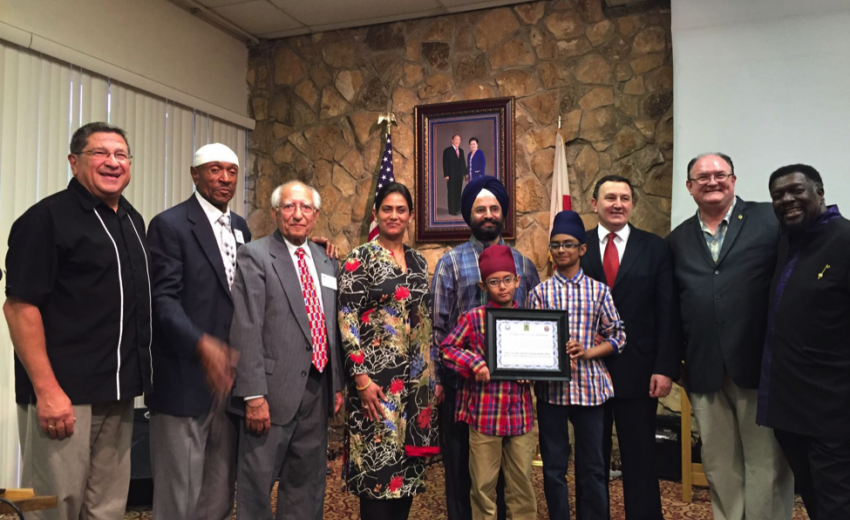Dr. Harbans Lal is the Ambassador of the Parliament of World Religions. He is the Emeritus Professor & Chairman, Dept of Pharmacology & Neuroscience at the University of North Texas Health Science Center.
Dr. Harbans Lal was among a group of faith leaders honored with the "International Medal of Honor" for his lifelong commitment to promoting interfaith cooperation among people of all faiths in an Award Banquet held on November 12, 2016, in Irving, Texas to recognize 28 Honorees with achievements in several areas of public service. The award medal was presented by the Grace International Seminary, founded and led by President Dr. Karen Hollie-Thibodeaux. She is also the Senior Minister of The Lifeway Church of Dallas, the first seminary for women in the United States, with chapters in other locations.
A renowned neurologist and scholar, Dr. Lal has been actively involved in interfaith discussions and engagement in Pakistan, India, and the United States since 1956. As a high school student (1940–1966) in his native Pakistan, he encouraged joint Sikh-Muslim-Hindu interfaith conversations at the town library, which he oversaw. He joined the All India Sikh Students Federation's Executive Committee at this time, and in 1954 he was elected to the position of national president.
In 1956, Dr. Lal led debates and dialogues between Hindu, Sikh, Muslim, Christian, and Jewish students at the University of Kansas in the United States. During this year the students celebrated Guru Nanak's Birthday, this was the first time n American university campus celebrated Guru Nanak's Birthday. Dr. Lal continued his interfaith activities at the University of Chicago (1958-1964), organizing fireplace discussions on interfaith topics.
In 1983, Dr. Harbans Lal was invited to join the Interfaith Council of Thanks-Giving Square in Dallas, Texas. The members of this Council represent all major religious traditions around the world. In addition to seminars, they organize workshops. Their approach to religious issues is based on the appreciation of the positive qualities found in all cultures and religious traditions. Locally and internationally, this group has been recognized as a strong force for positive change.
As a member of the Interfaith Council, Harbans Lal has appeared at many Interfaith Council events, including the Annual National Day of Prayer, the International Millennium Thanksgiving Conference, and the United Nations Thanksgiving Symposium, among others. Additionally, he has represented Sikh thought at the Parliament of World Religions in Cape Town, Barcelona, Australia, Salt Lake City, and the United Nations Summit of World Religious Leaders in New York. He has served as the Parliament's Ambassador for more than a decade.
In Amritsar and Lahore, Harbans Lal co-organized the 2001 International Conference on Interfaith Dialogue Promoted by Guru Nanak. There were scholars from across the globe who spoke about the necessity of interfaith engagement, including Christians, Hindus, Judaism, Islam, Buddhism, and Sikhism.
Dr. Bhai Harbans Lal is well-known and esteemed by scientists, religious institutions, and his Sikh community all over the world. His academic career includes publishing over 400 research papers, 20 books, several research reviews, and 56 chapters in technical books.
A religious devout Sikh
Harbans Lal was one of the founders of the All India Sikh Students Federation (AISSF), and he later served this movement in a variety of capacities, culminating in his election as AISSF President (1954-56). He was also the Editor-in-Chief of the Sikh Students' Bulletin, an AISSF monthly journal. The AISSF honored him with their highest honors and medals. These recognitions included the title of Bhai Sahib and the Nishan-e-Khalsa, the highest awards ever conferred to a Sikh scholar. Sardar Gurcharan Singh Tohra, President of the Shiromani Parbandhak Committee, presented Dr. Harbans Lal with the ceremonial Siropa and the Sri Sahib (ceremonial sword) at a Samundri Hall Conference in the Darbar Sahib Sri Amritsar complex in 1963. In Sikh circles, Dr. Harbans Lal is now known as Bhai Harbans Lal.
In 1995, Guru Nanak Dev University awarded him the Degree of Doctor of Literature (honoris causa) in recognition of his contributions to Sikh Studies.
Apart from the Sikh faith, Dr. Lal has received recognition from institutions of religions also.
On Unity Day USA, Dr. Lal received a Lifetime Achievement Award. This honor was given to those who worked to foster unity in the USA after hate crimes in response to the terrorist attacks of September 11, 2001. Dr. Harbans Lal was recognized by Masjid Imam W. Deen Mohammed in 2010 at its Second Annual Ummah Awards Appreciation Dinner. The word "Ummah," which means "Community" in Arabic, is used to honor those who endeavor to promote community growth by bridging the gaps between people of different faiths, races, and cultures to foster community and understanding.
Dr. Harbans Lal is a founding member of the School of Scientific and Logical Interpretation of Gurbani and is a well-known pharmacologist/neuroscientist as well as a renowned Sikh theologian. He is dedicated to bringing out the truth of Gurbani logically, rationally, and scientifically. In his works, Dr. Lal presents genuine and intellectually brave attempts to interpret the Gurbani. Undoubtedly, his choice of paradigm and vision has been impacted by his scientific training and professional life as a scientist.
Dr. Harbans Lal upholds the essence and spirit of Guru Nanak's teachings, which contends that all people, regardless of faith, deserve to live in an equitable society. Through his works, Dr. Lal stands to promote the fundamental principles of the Sikh faith, including respect for human rights, fairness to everyone, the dignity of hard work, and coexistence with one's neighbors.
